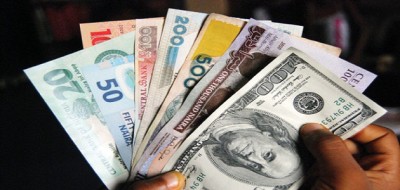Nigeria has withstood mounting pressure to devalue the naira since March, defending the currency against events ranging from the crash in oil prices to being booted out of one of the world’s biggest emerging-market bond indexes. The defense may not hold for much longer.
A record 6 trillion-naira ($30 billion) budget for 2016, and the prospect of more borrowing to pay for it, will increase demand for imports and swell the amount of local currency in circulation, making it harder for President Muhammadu Buhari’s government to hold the exchange rate, according to Credit Suisse Group AG and Investec Ltd. While the naira is all but fixed at 197-199 per dollar, prices of forwards suggest traders expect it will weaken 11 percent to 222.5 in three months and 23 percent to 258.5 in a year.
Unlike other oil exporters such as Russia and Colombia, which have let their currencies depreciate, Africa’s top producer has starved banks and their customers of foreign exchange in an attempt to prop up the naira. The black-market rate used by exchange bureaus fell to a record 265 per dollar on Wednesday amid soaring demand for the U.S. currency. Foreign stock and bond investors have fled the country in anticipation of a devaluation, which would cause losses on their naira holdings.
Nigeria generates 90 percent of export earnings and two-thirds of government revenue from oil. Its finances have been battered by Brent crude’s more than 60 percent slide to below $40 a barrel since June 2014. The naira fell 21 percent between then and early February to a record 206.32, before central bank Governor Godwin Emefiele introduced trading curbs that kept the currency in a narrow band and stemmed the rout. In June, he went further by stopping importers of around 40 items from toothpicks to glass and wheelbarrows from buying foreign exchange.
Those measures dried up liquidity in the currency market, leading JPMorgan Chase & Co. to ditch Africa’s biggest economy in September from its local-currency bond indexes for developing nations, which are tracked by more than $200 billion of funds. Barclays Plc soon followed suit with its equivalent indexes.
Investors have blamed Emefiele’s policies, which are backed by Buhari, forexacerbating Nigeria’s economic slump by deterring foreign investment and preventing businesses from buying essential imports. Growth is set to easeto 3.2 percent this year, the slowest pace this century, according to a Bloomberg survey of economists.
Boosting Spending
Vice President Yemi Osinbajo, whom Buhari has delegated to oversee the economy, said in an October interview that the government would avoid a recession by boosting spending, especially on infrastructure such as roads and railways. Expenditure for 2016 will rise about a fifth from this year and the budget deficit will more than double to 2.2 trillion naira, or 2.2 percent of gross domestic product, according to a plan Buhari asked politicians to approve on Dec. 8 — something they are yet to do.
The government will base its budgets for the next two years on oil prices of $38 a barrel in 2016 and $48 in 2017, according to the fiscal plan.
There’s no guarantee Buhari, a 72-year-old former general who also tried to hold the naira when he last ruled the country in the mid-1980s, and Emefiele will back down and let the currency weaken. Doing so could hurt the president politically in a country where the “public often views the currency as a performance gauge,” according to Investec’s Becker.
“Devaluation appears to be a bad word he doesn’t want to hear,” Bolaji Balogun, chief executive officer of Lagos-based investment bank Chapel Hill Denham Group, said in an interview. “This is a president whose instinct is to provide for the wider mass of Nigerians and he just thinks this will be harmful to them. That’s the issue. Whether the consequences are bad or otherwise, I suspect the government will continue to try and defend the currency at these levels.”
Curbing Supplies
That’s becoming more difficult for the central bank. Its foreign reserves stood at $29.5 billion on Dec. 14, the lowest since early July and down 21 percent since June last year. Deputy Governor Sarah Alade told bankers last month that the Abuja-based regulator would further curb dollar supplies to try and save its reserves.
Extra borrowing by the government may push the central bank to the brink. Credit Suisse estimates debt issuance will increase to $41 billion in 2016 from $30 billion this year.
“We expect the government to issue a sizable amount of debt to finance a larger budget requirement,” said Chernay Johnson, an analyst at Credit Suisse in Johannesburg, who forecasts the currency depreciating by about 10 percent to 220 in the first half of next year. “Pressure on the central bank to devalue the naira will mount.”



Be the first to comment